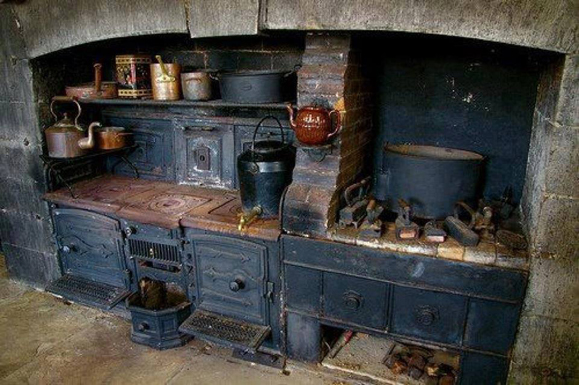Our cover story on top chef and restauranteur, Barbara Lynch got me thinking about my first forays into cooking, which involved wrestling with a Stanley wood-burning stove. I have fond memories of that black-iron beast, and the time I spent practically hugging it for the warmth that it threw off. Always cold as a child, the “range” as we called it, was the only source of heat in the kitchen, and I stayed as close to it as possible, often warming my feet in the oven on winter days.
I learned to cook when I was very young, to boil potatoes on top of the stove, and fry sausages and eggs, and I learned to bake, but my mother was the master of the fire. She knew how to stoke it, how much wood was needed to get the oven temperature just right so that our apple tarts came out with a nice golden crust. It was a talent that I came to appreciate when I was left in charge of the house for the first time. I was 12, and mother was away giving birth to one of my younger siblings. A hospital stay of 24 hours is now the norm, but back then women stayed in hospital for at least a week.
I enjoyed being in charge of my younger siblings while my mother was away. (Later they would accuse me of being bossy, but I like to think I was a benevolent dictator!) In my memory of that time, my mother was barely out the door when I had the baking utensils out and I was making my favorite buns. I measured all the ingredients (quadrupling the recipe since there were so many of us) and mixed everything in the yellow porcelain bowl. Then I poured the lot into two bun (cupcake) trays and after carefully putting them in the oven, I waited. And watched, and waited some more.
After an hour, the buns were as pale as when I first put them in. I added more wood to the fire, but to no avail. No matter how much I poked the logs, I couldn’t get the oven temperature up. Finally, I gave up and took them out, still pale in color and hard as stone. Alas, my brother Dessie happened into the kitchen just as I was taking them out the oven. Biting into one of my anemic specimens, proved to be an experience that he never forgot, and has never let me forget, either. Luckily, he lives on the West Coast, so I don’t see him that often, but when I do, his first question, more often that not, is: “Made any rock buns lately?”
Things got much easier in the cooking department when we got a gas cooker, but that old Stanley range, rock buns aside, still holds a warm spot in my heart.
All this reminiscing is by way of saying that I identify with Barbara Lynch, who at age 12, was cooking for the priests in Southie, her Boston Irish neighborhood. I will venture to say that shouldering that kind of responsibility early in life didn’t do her any harm, nor me either.
Another thing that endears Lynch to me is that in my early years in New York, I spent a lot of times in restaurants – waitressing. I remember those times with great affection. I loved the social aspects of the job, how everything revolved around the kitchen, and that wonderful surge of adrenalin that you got during the lunch and dinner rushes. But most of all, I remember the camaraderie that we shared as a team. We were all young and far away from home, mostly immigrants from different parts of the globe, and we had a lot fun together.
Lynch’s story is one of many interesting features in this, our summer reading issue. Rosemary Rogers writes a thought-provoking piece on reporter Dorothy Kilgallen who was investigating JFK’s assassination when she herself died under mysterious circumstances. Colin Lacey’s piece on the roots of Irish and its links to other languages highlights the common bonds we share with others. (And reminds me again of the restaurant workers I knew back in the day. I dare say, that should I find myself on the other side of the wall, my kitchen Spanish will stand me in good stead.)
In other stories, Geoffrey Cobb writes about Thomas Crawford, the son of Irish immigrants, whose “freedom” statue sits on top of the U.S. Capitol dome. Olivia O’Mahony writes about Samuel Beckett, and Ray Cavanaugh writes about the Healys, a mixed-race family who passed for white back when inter-racial marriages were forbidden.
On a cheerful note, Allen Leech, Downton’s Abbey’s Irish chauffeur, takes questions from Adam Farley, and Edythe Preet writes about her father, his love of literature, his story-telling abilities, and his passion for strawberry shortcake. And there’s lots more besides. When you are done reading, I recommend Maudie, a beautiful movie that I’m sure you will love as much as I did. You can read about it in this issue too.
Mórtas Cine. ♦


Leave a Reply